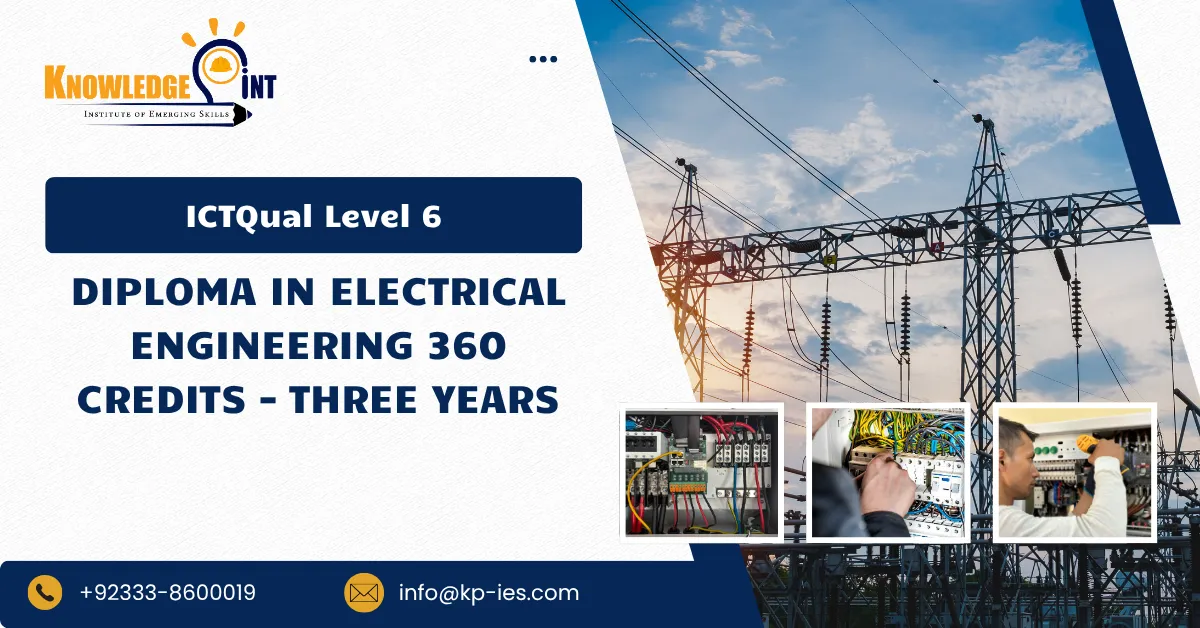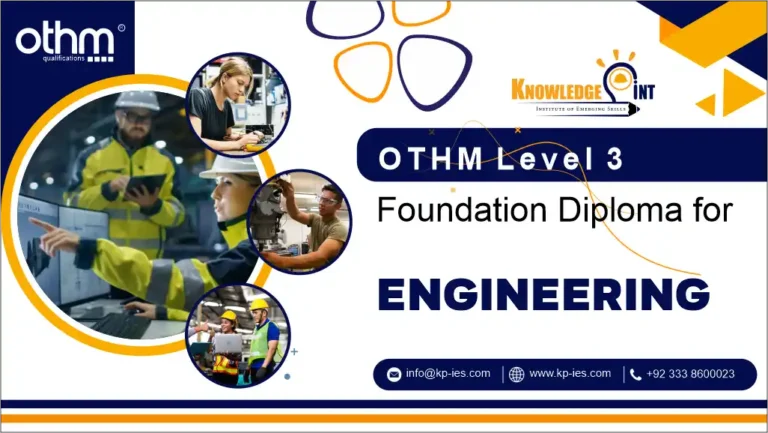Are you passionate about electrical engineering and looking to elevate your career to new heights? The ICTQual Level 6 Diploma in Electrical Engineering is the perfect course for individuals eager to gain comprehensive knowledge and practical experience in electrical systems, circuits, and the latest technology in the field. This 360-credit, three-year program offers in-depth education, covering everything from fundamental electrical principles to advanced systems and technologies, providing the skills and qualifications needed to thrive in today’s competitive job market.
The ICTQual Level 6 Diploma is an industry-recognized qualification designed to equip students with the essential skills and expertise required for various roles within the electrical engineering sector. With the rise of new technologies and the growing need for highly skilled engineers, this diploma offers a strong foundation and prepares graduates for leadership roles in the field.
The ICTQual Level 6 Diploma in Electrical Engineering is a comprehensive, forward-thinking program designed for individuals who are passionate about pursuing a rewarding career in electrical engineering. By combining theoretical knowledge with practical skills and focusing on the latest industry trends, this diploma prepares graduates to excel in the rapidly evolving field of electrical engineering. If you’re looking to build a strong foundation and progress to the highest levels of the industry, this qualification is the key to unlocking your future.
Course Overview
The ICTQual Level 6 Diploma in Electrical Engineering 360 Credits – Three Years consists of 36 mandatory units which are as follows.
Year 1: Foundational Knowledge
- Engineering Mathematics I
- Fundamentals of Electrical Circuits
- Principles of Electronics
- Digital Logic Design
- Electrical Machines and Transformers
- Introduction to Control Systems
- Engineering Drawing and CAD
- Introduction to Microprocessors and Microcontrollers
- Electrical Measurement and Instrumentation
- Physics for Engineers
- Health and Safety in Engineering
- Sustainability in Electrical Engineering
Year 2: Intermediate Proficiency
- Engineering Mathematics II
- Power Systems Analysis
- Analog Electronics
- Embedded Systems and Applications
- Electrical Energy Systems
- Signals and Systems
- Principles of Automation and Robotics
- Industrial Electronics
- Communication Systems Engineering
- Renewable Energy Technologies
- Electrical Project Management
- Technical Report Writing and Research Methods
Year 3: Advanced Specialization and Application
- Advanced Power Electronics
- Smart Grid Technology
- Electrical Machine Design
- Advanced Control Systems
- High Voltage Engineering
- Instrumentation and Process Control
- Advanced Embedded Systems
- Energy Storage and Conversion Systems
- Wireless and Optical Communication
- Electromagnetic Compatibility
- Capstone Project
- Professional Development and Ethical Practices
Learning Outcomes for ICTQual Level 6 Diploma in Electrical Engineering
Upon successful completion of the ICTQual Level 6 Diploma in Electrical Engineering, students will have gained the knowledge, skills, and expertise necessary to excel in the electrical engineering field. The learning outcomes are structured around foundational principles, intermediate proficiency, and advanced specialization, ensuring comprehensive expertise in electrical engineering.
Year 1: Foundational Knowledge
- Engineering Mathematics I:
- Apply mathematical techniques to solve engineering problems, including algebra, calculus, and differential equations.
- Fundamentals of Electrical Circuits:
- Analyze and design basic electrical circuits, applying Ohm’s Law and Kirchhoff’s Laws to solve problems.
- Principles of Electronics:
- Understand the basic concepts of electronics, including semiconductors, diodes, transistors, and amplifiers, and their applications in circuits.
- Digital Logic Design:
- Design and implement simple digital circuits using logic gates, flip-flops, and other components.
- Electrical Machines and Transformers:
- Analyze the operation and design of electrical machines and transformers, understanding key principles such as electromagnetic induction and efficiency.
- Introduction to Control Systems:
- Understand the fundamentals of control systems, including open-loop and closed-loop systems, and their applications in electrical engineering.
- Engineering Drawing and CAD:
- Develop proficiency in engineering drawing and computer-aided design (CAD) tools for creating detailed electrical system designs.
- Introduction to Microprocessors and Microcontrollers:
- Understand the basics of microprocessors and microcontrollers, including their architecture and applications in electrical systems.
- Electrical Measurement and Instrumentation:
- Apply principles of electrical measurement and use instrumentation to measure and monitor various electrical parameters in circuits.
- Physics for Engineers:
- Understand the fundamental concepts of physics, including mechanics, electromagnetism, and thermodynamics, as they relate to electrical engineering.
- Health and Safety in Engineering:
- Identify and apply health and safety regulations in engineering practices, ensuring safe working conditions in electrical environments.
- Sustainability in Electrical Engineering:
- Analyze the environmental impact of electrical engineering projects and propose sustainable energy solutions.
Year 2: Intermediate Proficiency
- Engineering Mathematics II:
- Utilize advanced mathematical techniques, including complex numbers, matrix theory, and Fourier analysis, in the context of electrical engineering problems.
- Power Systems Analysis:
- Analyze and design power generation, transmission, and distribution systems, applying principles of electrical power systems and fault analysis.
- Analog Electronics:
- Understand and design analog electronic circuits, including amplifiers, oscillators, and filters.
- Embedded Systems and Applications:
- Design and implement embedded systems, including programming microcontrollers for specific electrical applications.
- Electrical Energy Systems:
- Analyze various electrical energy generation systems, including conventional power plants, renewable energy sources, and their integration into the power grid.
- Signals and Systems:
- Study the behavior of signals and systems, including time-domain and frequency-domain analysis techniques for system analysis.
- Principles of Automation and Robotics:
- Understand the principles of automation, robotic systems, and their integration into manufacturing and industrial applications.
- Industrial Electronics:
- Study the electronics used in industrial applications, including sensors, actuators, and control systems.
- Communication Systems Engineering:
- Analyze the principles of communication systems, including modulation, demodulation, and signal processing techniques used in telecommunications.
- Renewable Energy Technologies:
- Explore renewable energy technologies, such as solar, wind, and geothermal systems, and their integration into electrical power grids.
- Electrical Project Management:
- Manage electrical engineering projects, including planning, resource allocation, risk management, and budget control.
- Technical Report Writing and Research Methods:
- Develop skills in technical writing and research, learning to present engineering findings clearly and effectively.
Year 3: Advanced Specialization and Application
- Advanced Power Electronics:
- Design and analyze complex power electronic circuits, including inverters, rectifiers, and converters, for industrial and renewable energy applications.
- Smart Grid Technology:
- Understand the principles of smart grid technology, including its components, communication protocols, and applications in modern power systems.
- Electrical Machine Design:
- Design electrical machines, such as motors and generators, with an emphasis on efficiency, cost, and performance.
- Advanced Control Systems:
- Analyze and design advanced control systems, including PID controllers, state-space models, and optimal control techniques.
- High Voltage Engineering:
- Study the principles and applications of high-voltage systems, including insulation, breakdown voltage, and the design of high-voltage equipment.
- Instrumentation and Process Control:
- Understand the principles of instrumentation and process control, focusing on systems for measuring and controlling industrial processes.
- Advanced Embedded Systems:
- Design and implement complex embedded systems with real-time processing capabilities, including for applications in industrial automation.
- Energy Storage and Conversion Systems:
- Explore energy storage and conversion systems, including batteries, supercapacitors, and fuel cells, and their integration into electrical systems.
- Wireless and Optical Communication:
- Understand the principles of wireless and optical communication systems, including fiber-optic networks, radiofrequency communications, and the underlying technologies.
- Electromagnetic Compatibility:
- Study the principles of electromagnetic compatibility (EMC) and the design of electrical systems to minimize interference and ensure compliance with regulations.
- Capstone Project:
- Apply theoretical and practical knowledge gained throughout the course to a final project that demonstrates the student’s proficiency in electrical engineering.
- Professional Development and Ethical Practices:
- Develop essential professional and ethical skills, including communication, teamwork, and decision-making, with a focus on the ethical responsibilities of engineers.
Course Benefits of ICTQual Level 6 Diploma in Electrical Engineering (360 Credits – Three Years)
The ICTQual Level 6 Diploma in Electrical Engineering offers a comprehensive and in-depth education in the field of electrical engineering. By completing this course, students will gain a strong foundation in both theoretical concepts and practical applications. Here are some of the key benefits of pursuing this course:
- Advanced Knowledge and Expertise:
- This diploma provides advanced knowledge in key areas of electrical engineering, including power systems, electronics, control systems, and renewable energy technologies. Graduates will have the expertise to design, analyze, and manage complex electrical systems and projects.
- Comprehensive Curriculum:
- With a curriculum spanning three years, students are exposed to a wide range of topics, from foundational subjects like electrical circuits and thermodynamics to specialized areas such as smart grid technology, power electronics, and energy storage. This ensures a well-rounded education in electrical engineering.
- Hands-on Experience:
- Practical experience is integrated into the course through projects, labs, and simulations. Students will gain hands-on skills in designing electrical systems, troubleshooting issues, and using industry-standard software like CAD and simulation tools, ensuring they are job-ready.
- Industry-Relevant Skills:
- The course is designed to meet the evolving needs of the electrical engineering industry. With a focus on emerging technologies such as renewable energy, smart grids, and automation, graduates will be equipped with the skills to work in cutting-edge areas of the industry.
- Career Progression Opportunities:
- The Level 6 qualification opens up a wide range of career opportunities in electrical engineering. Graduates can pursue roles such as electrical engineer, power systems engineer, control systems engineer, and renewable energy specialist, among others. The diploma also serves as a stepping stone for further studies or professional certifications.
- Professional Development:
- The course emphasizes professional skills, including project management, communication, and ethical practices. Students will also learn to write technical reports and conduct research, skills that are essential for career advancement and leadership roles in engineering.
- High Demand for Skilled Engineers:
- The demand for skilled electrical engineers is high, with industries such as power generation, renewable energy, telecommunications, manufacturing, and automation requiring qualified professionals. This diploma ensures that graduates are highly employable in these rapidly growing sectors.
- Global Recognition and Mobility:
- The ICTQual Level 6 Diploma is recognized internationally, providing graduates with the flexibility to work in a variety of global markets. The course meets international engineering standards, allowing students to pursue opportunities worldwide.
- Capstone Project:
- The capstone project provides students with the opportunity to apply their knowledge to real-world problems. This project helps develop problem-solving skills, fosters innovation, and demonstrates a high level of technical competence to future employers.
- Focus on Sustainability:
- As the world increasingly focuses on sustainability and environmental impact, this course includes modules on energy systems, renewable energy technologies, and sustainability in electrical engineering. Graduates will be equipped to contribute to environmentally responsible and energy-efficient projects.
Future Progression after ICTQual Level 6 Diploma in Electrical Engineering (360 Credits – Three Years)
Completing the ICTQual Level 6 Diploma in Electrical Engineering opens up a wide range of opportunities for career advancement and further academic pursuits. The skills, knowledge, and expertise gained from this course will provide a solid foundation for students to thrive in the electrical engineering field. Here’s a look at the potential future progression pathways:
- Advanced Academic Studies:
- Master’s Degree in Electrical Engineering: Graduates of the ICTQual Level 6 Diploma are well-prepared to pursue a Master’s in Electrical Engineering or related disciplines. This could include specialized fields like Power Systems, Renewable Energy, Telecommunications, or Automation and Control.
- Master’s in Renewable Energy Technologies: With the increasing global emphasis on sustainability and clean energy, graduates may choose to focus on renewable energy systems by pursuing a Master’s in this field.
- Professional Certifications:
- Chartered Engineer Status (CEng): In many countries, including the UK, the ICTQual Level 6 Diploma is recognized as a suitable qualification for individuals aiming to gain Chartered Engineer status. With additional professional experience and membership in engineering institutions, such as the Institution of Engineering and Technology (IET), graduates can become Chartered Engineers, enhancing their professional standing.
- Specialized Certifications: Graduates can pursue certifications in specialized areas such as power electronics, control systems, or smart grid technology. These certifications can help individuals become experts in specific fields, enhancing their career prospects.
- Engineering Leadership Roles:
- Senior Electrical Engineer: With the knowledge and experience gained from the diploma, graduates can step into leadership roles such as Senior Electrical Engineer, leading engineering teams and projects in power systems, automation, or electrical design.
- Project Manager in Electrical Engineering: Graduates with a focus on project management can advance to roles where they are responsible for overseeing large-scale electrical engineering projects, ensuring they are completed on time, within budget, and according to the highest technical standards.
- Industry-Specific Roles:
- Power Systems Engineer: As a power systems engineer, graduates can work with utilities and energy companies, designing and managing power grids, electrical networks, and renewable energy systems.
- Control Systems Engineer: Specializing in automation, graduates can design and implement control systems for industrial processes, robotics, and manufacturing systems.
- Smart Grid and Renewable Energy Specialist: With an increasing focus on smart grids and green energy, graduates can contribute to the development and optimization of energy-efficient systems, focusing on renewable energy sources and grid modernization.
- Entrepreneurship and Innovation:
- Start Your Own Engineering Firm: Armed with technical expertise and a solid understanding of the electrical engineering landscape, graduates may opt to start their own engineering consultancy or product development company, providing specialized services in electrical systems, renewable energy, automation, or power systems.
- Innovation in Technology: The increasing global focus on digital transformation and smart technologies offers opportunities for graduates to be at the forefront of innovations in areas like smart homes, autonomous systems, and industrial automation.
- Global Career Opportunities:
- International Engineering Roles: The ICTQual Level 6 Diploma is globally recognized, which means that graduates have the opportunity to pursue careers in electrical engineering in various international markets. This opens up roles with multinational corporations, energy companies, and government agencies around the world.
- Consultancy Roles in Global Projects: With expertise in power systems, control systems, or renewable energy, graduates can participate in high-impact global engineering projects, contributing their technical knowledge to major infrastructure and energy initiatives.
- Research and Development:
- Research Engineer or Scientist: Graduates may choose to engage in research, working in research labs or academic institutions to develop new technologies in areas like smart grids, energy storage, or advanced power electronics.
- Product Development Engineer: Working with engineering teams, graduates can contribute to the design and development of cutting-edge electrical products, from energy-efficient systems to next-generation electrical devices.







